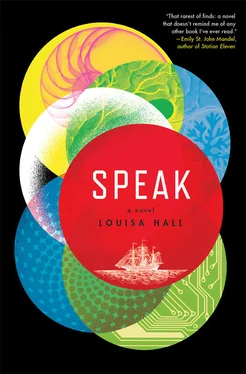My second attic apartment was big enough for a desk, but it had no window, and no entrance of its own. I lived in fear of having to go out and make conversation with the old woman below me. Then I met you. You said I lived like a spy, but I had no idea how different we were until I moved in with you in Wisconsin. Then I learned about wooden bookshelves, potted plants, linen closets: all those mysterious trappings of a place that’s been successfully settled .
Sadly, your influence in that domain didn’t stick. I’ve lived in this apartment nearly twenty years, and I still haven’t bought any rugs. At first, I thought it would be temporary, a one-year transition space, but then the years ensued. I’m still not sure why I haven’t left. I suppose I’ve come to feel comfortable here. I’m oddly attached to the books on the floor, the buzz-cut carpet in the communal hallways, the disconcerting elevator ride, the doormen with their judgmental expressions. I enjoy the temporary ambience .
But after finishing that documentary, I did have to ask myself what I gave up. That movie was like poison poured in my ear. All night I lay awake. The twenty years between now and then folded like a paper fan, and I returned again to our house. I felt the worn metal tongue of the door handle under my thumb, the weight and give of the door as I pushed. The windows in the living room were enormous. I never wanted blinds, but you insisted. In the end, we installed blinds. You had a remarkable capacity for deafness when someone contradicted you. So we had blinds, but during the day, light still flooded the room. It spread over our sofa, your potted plants, the wood record console you built in Wisconsin. Over the armchair where I liked to read, there was a yellow basket lamp, salvaged from a thrift store you came across. On the walls, artwork painted by friends .
Everything in that house was an expression of you: your friendliness, your wandering, your strong aesthetic opinions. Only I wasn’t. Off in the corner, under the yellow basket lamp, a little black hole of malevolent feeling. I was a persistent design flaw. I never even planted that sapling over the hole where we buried Ada. I let it remain bare. Every time you looked out the window in the direction of that patch of dirt, I saw you flinch, but for me it was a comfort, making my tea in the morning, confronting the fact of that brown earth. She was right there. We’d been able to bury her body .
I now suspect that when you married me, you imagined you’d shape me as you’d shaped your apartments. Your refugee wife, representative of grief. Not grief unwieldy, not without purpose, but aestheticized, admirable, cut to fit a blank corner. Like a Native American tapestry, or an Oriental rug .
Later, when you started your campaign against computerized intelligence, I added authenticity to your claims. My story provided much-needed heft to the comparisons you drew between this war and that, this tyrant and the other. As though every madman were related, as if every death were the same .
I heard you once, you know. In that auditorium that looked like a church. At your feet, the stained glass windows cast bloodred, rhomboidal shadows, like gifts brought to you by the Magi, and you used my sister’s death to validate a claim about the impurity of science. I stood at the back, wearing my raincoat, and my stomach rose to my throat .
That’s what it took for me to understand why I guarded my losses from you. To comprehend a presentiment I’d been fending off for years, I had to hear you discuss me on a panel, in front of three hundred students. They nearly trampled me, clawing their way down the aisle to adore you .
That was in the beginning, only a few months after you started to criticize MARY. At that point we’d been married for nearly twenty years. But that panel discussion was the first time I understood clearly that I’d become part of your story. You asked me questions, but you had expectations when it came to my answers. I was meant to follow a script. Like MARY, you told me which patterns to follow .
On my way home from that lecture, I walked along the Charles, feeling increasingly frozen, and when I entered our house — a house I’d loved from the beginning — I saw that I was as alive to you as the sofa, as lovely as that wooden console, as independent as the blinds on the windows. Then I started hating that house. My malevolence increased. I wouldn’t respond to your questions: anything to avoid fulfilling your patterns .
But now the old chorus starts singing again. What do I know about independence? You loved me, you let me live in that house, and I responded with silence. Once, with feeling, with natural conviction, you used my family’s murder to make a point stronger. So what? How could I have responded so fiercely?
This morning, when I made the final decision to get out of bed, I came straight to my desk to write a letter back to you. My first response in over a decade. Usually I read your biannual letters over my afternoon tea, steeped in the odd silence of my altitudinous apartment, then grade some papers to settle my stomach. After dinner, when I return to your letter, I place it gently in a file called “Karl.” I’ve kept every one of your letters. I keep them because one day they’ll write a definitive biography, and these letters will be of importance. Not as important as the letters you write to your graduate student, who fills your Indian vases with flowers, but what does that matter? For you, I want the best biography. Let them not miss a detail. Let them know that you loved me the best way you could. Let them know I loved you enough to keep every letter you sent me, even if I never wrote back .
I’ve always felt that if you were listening closely enough, my silence would explain itself. But now, after a night such as the one I’ve just spent, I fear I owe you a clear explanation. I never write back to your letters because they don’t require response. They update me on your awards, your travel, your speeches, the accolades that pour in. Such letters don’t pave the way for an answer. What you’re looking for is approval. If I were to respond with what I really think, which is that you abandoned a project halfway, created a partial person and then became threatened when people adored her, it would be the reaction of an embittered old woman. The only response I can make, besides lying about how I admire your work, is to maintain my imperfect silence .
But it doesn’t mean I don’t miss you. Sometimes I’m not even sure why it started. One day in the sixties, you commenced your campaign against artificial intelligence, and I initiated my silence. We’re both stubborn people. We followed our campaigns to their ends. But if I swim upriver, past the years of subsistence in this sterile apartment, past the wreckage of our little house, it’s possible to arrive at a place where those campaigns have no meaning .
I’d like to write a letter and send it from that place. Or perhaps I won’t send it at all. If I do, I’ll expect a perfect response, and when that doesn’t come I’ll be angry. Maybe it’s better to read my letter to MARY. Now that she has memory, words given to her will last longer than any mere letter. My words to you, kept safe in her program, will last longer than my file marked “Karl.” Longer than the house we lived in together, longer than our marriage, longer than our bodies when they’re both underground, buried, unimaginably, an ocean apart, as though we never slept in the same bed .
(5) The Diary of Mary Bradford
1663
ed. Ruth Dettman
Читать дальше












